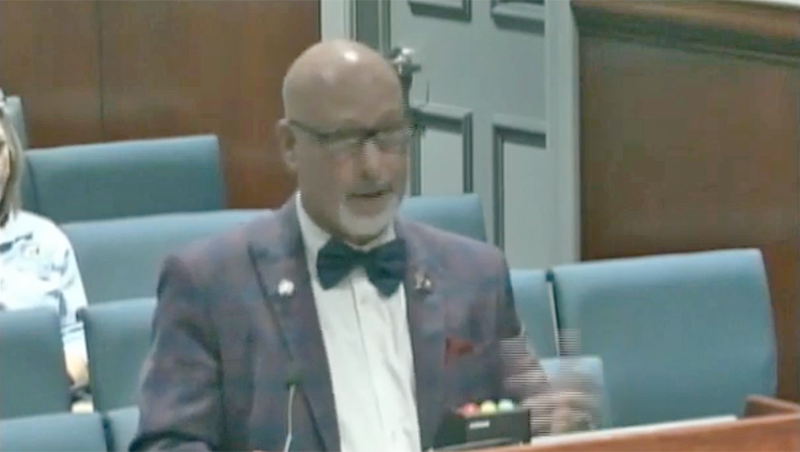Rep. Bobby Hanig addresses Eagle Creek sewage service frustrations
Published 8:50 am Sunday, December 19, 2021

- State representative Bobby Hanig speaks to the Currituck Board of Commissioners regarding the Eagle Creek wastewater issues in Moyock that have left residents without sewer service. Currituck meeting screenshot
|
Getting your Trinity Audio player ready...
|
The December Currituck commissioners meeting opened with a presentation by State Representative Bobby Hanig, R-Currituck, addressing concerns about the Eagle Creek wastewater facility that left 420 homes without sewer service several weeks ago and has caused raw sewage backups in homes.
The sewage system and wastewater treatment plant is owned by Sandler Utilities but managed by Envirolink. The Eagle Creek community is on public water, but water from toilets, showers and sinks flow into the sewage system. Residents have been dealing with the problem for over a year.
“We’ve been communicating with commissioners, with staff, with DEQ, with legislative folks in Raleigh. It’s been a tough effort, but I think through these efforts we’re starting to make some progress,” Hanig said. He also assured the board that work was getting done, though communication from Envirolink has been frustratingly inadequate. According to Hanig, Envirolink has now committed to daily communication updates to county staff about the repairs, and over the last 30 days Envirolink has installed 81 pedestals, concentrating on Eagleton Circle and Green View Road area, “which seem to be the most problematic.”
There is a court date set for December 20, by which Sandler and DEQ must come up with a resolution to the sewage problems. Continued Hanig, “If the judge is satisfied, they’ll move forward with the resolution . . . if the judge isn’t satisfied, he will hold Sandler in contempt and you know with contempt comes higher fines and the possibility of jail time.”
To the Eagle Creek residents, Hanig said “I can tell you that the update I got this afternoon was that Sandler has committed to give [Envirolink] all the parts they need to make the system whole, and as fast as the parts come in Envirolink will be putting them in. For you folks out there, I know it’s frustrating and we get it, trust me we get it, and I think we’re doing everything that we can so please understand that.”
Next, Emergency Management director Mary Beth Newns spoke about the county’s emergency radio system. “We’re having problems with the radio system, and it seems to be getting worse,” she said. Newns then introduced a representative from Televate, a Virginia based public safety technology consulting firm specializing in interoperable communications infrastructure, devices and software. The key issues from Televate’s analysis include microwave and reliability issues between the county’s dispatch center and the end users, lack of sufficient repeated channels for incident support, coordination and interoperability, areas of degradation in equipment, outdated core infrastructure hardware and software, and a lack of indication when a user goes out of range of the network.
To bring the system up to a reliable public safety system, Televate recommended several short-term action items, as well as other solutions that would increase connectivity and reliability over the long term. These solutions come at a hefty price tag, from several hundred thousand dollars up to and beyond $6 million, depending on options chosen. Though some grant funding is expected, the county would be looking at funding the majority of the cost. No decisions were made at the meeting.
Commissioners then approved Pine Island’s request to build a cabana amenity and designate a small commercial space, as well as approved the design build for Moyock Elementary School at a guaranteed maximum price of $14,259,800. The finish date for the elementary school is still on track for August 2023.
The meeting closed with a request from county attorney Ike McRee for approval of the national opioid settlement agreement. Distributors will pay a max of $21 billion dollars over 18 years, and Johnson and Johnson will pay $5 billion over 9 years, with 85% of North Carolina’s proceeds going directly to the counties. “County government is best suited to use and distribute this money toward abatement of the opioid epidemic in each litigating county’s jurisdiction,” said McRee.
McRee did not say when the county was due to receive their portion of the settlement money. The board approved the settlement agreement.






